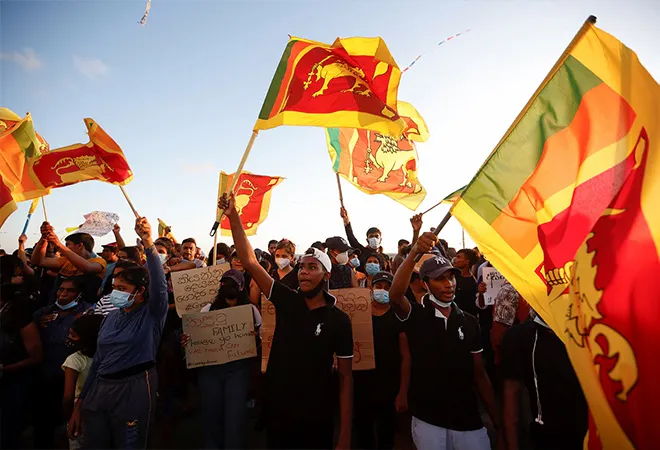-
CENTRES
Progammes & Centres
Location
Amidst the ongoing Sri Lankan economic crisis, the need of the hour for the present government is to plan and take steps for reform.

The Sri Lankan government is close to finalising a staff-level agreement with the International Monetary Fund (IMF) after months of discussions. This would pave the way for securing a bailout from the emergency lender of around US$800 million a year and bridge financing from other multilateral development banks, providing much-needed foreign currency inflows to the country. Shortages in fuel availability have eased with the introduction of a rationing system and freeing up the forex reserve by collapsing non-oil imports. Cooking gas imports for three months are currently being financed by the World Bank, repurposing the money from existing commitments. Electricity cuts have reduced considerably due to a rise in hydropower generation. Yet, this is just a temporary respite and not a sustainable solution in the near term.
To place the economy on firmer ground, Sri Lanka needs to get on a path towards debt sustainability, contingent on expeditious renegotiation with Sri Lanka’s creditors (private and bilateral). The IMF’s executive board would approve an assistance package and release bailout funds only once they have received ‘adequate financing assurances’ from Sri Lanka’s various creditors. This means that even as a formal conclusion of restructuring negotiations could take up to a year, Sri Lanka would have to secure some initial concurrence from major creditors, and the fund’s major shareholders like the United States (US) are confident that all creditors would be treated fairly. In the interim, the SLA is expected to set the contours of Sri Lanka’s economic reform programme—tax hikes, spending cuts, and rationalising state-owned enterprises—to reassure international creditors that the country is on an adjustment path.
The IMF’s executive board would approve an assistance package and release bailout funds only once they have received ‘adequate financing assurances’ from Sri Lanka’s various creditors.
But it is not a foregone conclusion that Sri Lanka will be able to implement a comprehensive reform programme. Anti-IMF public posturing by politicians, protests by the public around budget cuts and privatisation, and intra-government disagreements on the reform pathway could risk derailing urgent stabilisation measures and undermining near-term recovery efforts.
This latest IMF bailout would mark the 17th time that the country sought help from the emergency lender. In successive recent political cycles, the next government has promptly reversed policy reform agendas, resulting in policy whiplash and consequent macroeconomic damage. These have been especially worrying, considering Sri Lanka’s problematic post-war economic growth model.
To be sure, the current economic crisis has been in the making and was largely due to economic mismanagement and the growth model followed in the years after the end of the civil war in 2009. The post-war growth boom prioritised public debt-driven infrastructure spending, private investment in domestic non-tradable sectors (, and a lack of fiscal discipline required of a middle-income country increasingly borrowing on commercial terms.
As large financing envelopes were needed for the publicly-funded infrastructure construction spree, Sri Lanka turned to China, Japan, and international capital markets. As the economy graduated into upper middle-income status (narrowly defined using per capita income), loans at commercial rates had to be taken up. Sri Lanka soon enjoyed the ‘optics’ of being in this income category but ignored the structural reforms needed to ensure the ‘mechanics’ of what it takes to continue to grow through middle income and beyond. There was little focus on building better institutions, better human capital, and a more competitive and innovative economy.
The necessary reforms to improve productivity, efficiency, and economic competition did not occur. Debt service payments kept racking up, even as foreign revenue earning sectors narrowed.
Instead, public institutions were deeply politicised as well as captured by the rent-seeking business elite, spending on defence was prioritised over education, hiring into the civil service was rapidly expanded, and protectionist trade and industrial policies were pursued in favour of narrow vested interests. Many export-oriented sectors were consistently under-supported, and heavy dependency on tourism was witnessed. The necessary reforms to improve productivity, efficiency, and economic competition did not occur. Debt service payments kept racking up, even as foreign revenue earning sectors narrowed. The underlying weaknesses on both the fiscal side and the external account laid the groundwork for macro shocks that came in quick succession: A constitutional coup in October 2018, Easter Sunday bombings in April 2019, the onset of the COVID-19 pandemic in early 2020, and the Russia–Ukraine war in early 2022.
Whilst much of the reforms should have been done sequentially and steadily over the past decade, due to the urgency, they are now being done swiftly in a precarious macroeconomic context.
The austerity measures under an IMF-led programme will be pervasive. It will affect firms, workers, and households, on the back of an already weak economy, depressed quality of life, and rising prices. Sri Lanka’s economy contracted by 1.6 percent in the first quarter of the year, continuing the trend of tepid growth before the deadly Easter Sunday attacks of April 2019. The combination of COVID-19 and the current crisis has led to severe malnutrition amongst other socio-economic issues, with 86 percent of families buying cheaper less nutritious food and sometimes skipping meals altogether.
The most vulnerable communities will be worst affected by the forthcoming austerity measures. Political leaders are yet to articulate what measures will be taken to help these communities adjust.
We have already seen substantial revisions to end-user prices of energy. In March 2022, fuel prices were revised sharply upwards. The reintroduction of the fuel-pricing formula has increased fuel prices, with petrol and diesel prices increasing from 128 percent in June 2022 to 143 percent in July 2022, year-on-year. Cooking gas prices have increased by 229 percent between October 2021 and August 2022, whilst shortages have substantially eased. Electric tariff increases have just been announced, ranging from between 125 percent and 264 percent, depending on the usage. There are planned increases in water tariffs. The crisis has induced a widespread need to reform state-owned enterprises, and part of this is the reckoning about more cost-reflective pricing. However, making these sharp revisions suddenly, especially at a time of depressed incomes and consumer demand, will undoubtedly cause pain at the household level. An analysis by the Colombo Urban Lab in 2022 explores the Ceylon Electricity Board’s recent revision of prices, which fails to account for the ground realities faced by domestic consumers, particularly the urban poor.
The crisis has induced a widespread need to reform state-owned enterprises, and part of this is the reckoning about more cost-reflective pricing.
The government has yet to develop a meaningful social safety net beyond announcing modest cash transfers and doubling down on flawed programmes like ‘Samurdhi’. A research company, Verité Research Sri Lanka Economic Policy Group, suggested using electricity tariffs to design welfare benefit payments, but this ignores lived realities of many vulnerable communities - not least, informal workers, and the urban poor.
The recent energy and utility pricing revisions have paved the way for more adjustment measures in the months ahead. Sri Lanka has postponed structural reforms for far too long, and now they are being pushed through with urgency and with little time or effort to consider its impacts on the poor and vulnerable. This could have dangerous consequences. Efforts to push through these reforms without a clear articulation of its rationale, expected outcomes, and measures to protect the vulnerable, will be met with resistance by politicians and the public. Already, some influential politicians have doubled down on a familiar anti-IMF narrative. One of them has gone so far as to suggest that the IMF (and, in general, western institutions) are responsible for the current crisis in Ukraine.
The new government under President Ranil Wickramasinghe and Prime Minister Dinesh Gunawardena has a daunting task ahead. It is expected to bring about a range of reforms that had been ignored for over a decade in just a few years. And this, too at a time when there is a rampant trust deficit in the current leadership. The Cabinet of Ministers currently consists entirely of individuals who were part of the regime that oversaw the economic collapse.
Efforts to push through these reforms without a clear articulation of its rationale, expected outcomes, and measures to protect the vulnerable, will be met with resistance by politicians and the public.
The new President seems to be making some perfunctory efforts to form an ‘all-party government’—bringing in Opposition parties into the Cabinet. This could complicate matters, given the ideological differences. Yet, the chances of this unity government seem unlikely, with key smaller parties like the JVP rejecting the offer.
Even as efforts to forge political consensus continue in all earnest, an honest and open conversation with the electorate is now essential. The President, Prime Minister, and key Cabinet Ministers need to be upfront and discuss with the people what the next 1-2 years would be like, why certain steps being taken are necessary, and how the government will help the most vulnerable to adjust to the new conditions. Alongside this, ensuring that individuals fill key economic decision-making roles with credibility and competence would help rebuild confidence in the government’s ability to manage the economy.
The views expressed above belong to the author(s). ORF research and analyses now available on Telegram! Click here to access our curated content — blogs, longforms and interviews.

Anushka Wijesinha is an Economist based in Colombo and is a Co-founder of the public policy think tank Centre for a Smart Future. He was ...
Read More +